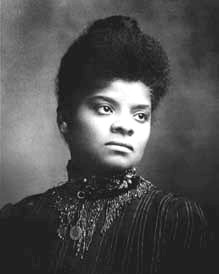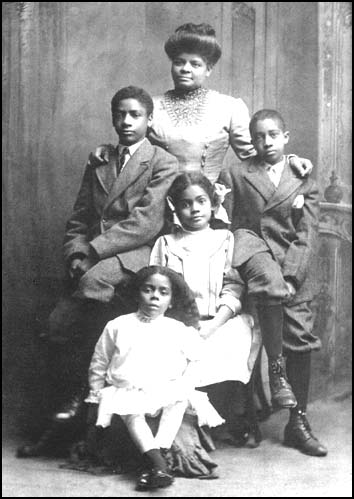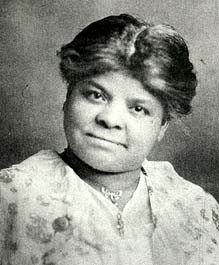|
Thank You Ida B Wells
for your Inspiration
I’d rather go down in history as one lone Negro who dared to tell the government that it had done a dastardly thing than to save my skin by taking back what I said. ~ Ida B Wells-Barnett
Ida B Wells
Activist, Journalist, Courage Specialist!
Ida was a teacher, journalist, anti-lynching campaigner, a 'fore-runner' to civil rights and 1 of the founders of the NAACP.
 The people must know before they can act, and there is no educator to compare with the press. ~ Ida B Wells-Barnett The people must know before they can act, and there is no educator to compare with the press. ~ Ida B Wells-Barnett
Ida B Wells Postage Stamp:

Ida with her 4 children:

|
Ida B Wells-Barnett was born in Holly Springs, Mississippi. Shortly after her birth, her parents were freed as slaves. When both her parents died of yellow fever when she was just 16 years old, she dropped out of high school and found employment as a school teacher. She helped raise her younger siblings, went to college, became a part-owner of the Memphis Free Speech newspaper where she launched her activist career. When a mob ransacked her offices and threatened her life if she did not leave town, she stood steady. She was however eventually forced out of town in 1895 so she moved to Chicago, where she married a widower and African-American rights advocate named Ferdinand Barnett. Together they had 4 children & published the Chicago Conservator, where Ida wrote many articles on the lynchings taking place in the south, as well as beginning to lecture widely. She was a founding member of the National Afro-American Council, served as its secretary, and was chairman of its Anti-Lynching Bureau. Wells was also one of the founders of the National Association for the Advancement of Colored People. Ida worked tirelessly for equal rights for African-Americans until her death in 1931 at age 69.
|

One had better die fighting against injustice than die like a dog
or a rat in a trap. ~ Ida B Wells-Barnett
More Of Ida Wells' Story
The "1st" Claudette Colvin/Rosa Parks
Found here: http://www.duke.edu/~ldbaker/classes/AAIH/caaih/ibwells/ibwbkgrd.html
It was in Memphis where she first began to fight (literally) for racial and gender justice. In 1884 she was asked by the conductor of the Chesapeake Ohio Railroad Company to give up her seat on the train to a white man and ordered her into the smoking or Jim Crow car, which was already crowded with other passengers. Despite the 1875 Civil Rights Act banning discrimination on the basis of race, creed, or color, in theaters, hotels, transports, and other public accommodations, several railroad companies defied this congressional mandate and racially segregated its passengers. It is important to realize that her defiant act was before Plessy v. Ferguson (1896), the U.S. Supreme Court decision that established the fallacious doctrine of separate but equal which constitutionalized racial segregation. Wells wrote in her autobiography:
I refused, saying that the forward car [closest to the locomotive] was a smoker, and as I was in the ladies' car, I proposed to stay. . . [The conductor] tried to drag me out of the seat, but the moment he caught hold of my arm I fastened my teeth in the back of his hand. I had braced my feet against the seat in front and was holding to the back, and as he had already been badly bitten he didn't try it again by himself. He went forward and got the baggageman and another man to help him and of course they succeeded in dragging me out.
Wells was forcefully removed from the train and the other passengers--all whites--applauded. When Wells returned to Memphis, she immediately hired an attorney to sue the railroad. She won her case in the local circuit courts, but the railroad company appealed to the Supreme Court of Tennessee, and it reversed the lower court's ruling. This was the first of many struggles Wells engaged, and from that moment forward, she worked tirelessly and fearlessly to overturn injustices against women and people of color. Her suit against the railroad company also sparked her career as a journalist. Many papers wanted to hear about the experiences of the 25-year-old school teacher who stood up against white supremacy. Her writing career blossomed in papers geared to African American and Christian audiences.
In 1889 Wells became a partner in the Free Speech and Headlight. The paper was also owned by Rev. R. Nightingale-- the pastor of Beale Street Baptist Church. He counseled his large congregation to subscribe to the paper and it flourished, allowing her to leave her position as an educator.
In 1892 three of her friends were lynched. Thomas Moss, Calvin McDowell, and Henry Stewart. These three men were owners of People's Grocery Company, and their small grocery had taken away customers from competing white businesses. A group of angry white men thought they would "eliminate" the competition so they attacked People's grocery, but the owners fought back, shooting one of the attackers. The owners of People's Grocery were arrested, but a lynch-mob broke into the jail, dragged them away from town, and brutally murdered all three. Again, this atrocity galvanized her mettle. She wrote in The Free Speech:
The city of Memphis has demonstrated that neither character nor standing avails the Negro if he dares to protect himself against the white man or become his rival. There is nothing we can do about the lynching now, as we are out-numbered and without arms. The white mob could help itself to ammunition without pay, but the order is rigidly enforced against the selling of guns to Negroes. There is therefore only one thing left to do; save our money and leave a town which will neither protect our lives and property, nor give us a fair trial in the courts, but takes us out and murders us in cold blood when accused by white persons.
Many people took the advice Wells penned in her paper and left town; other members of the Black community organized a boycott of white owned business to try to stem the terror of lynchings. Her newspaper office was destroyed as a result of the muckraking and investigative journalism she pursued after the killing of her three friends. She could not return to Memphis, so she moved to Chicago. She however continued her blistering journalistic attacks on Southern injustices, being especially active in investigating and exposing the fraudulent "reasons" given to lynch Black men, which by now had become a common occurrence.
About Ida B. Wells from her Great Grandson:
Trust What You Hear Color Seats
Sojourner Truth * Ida B Wells * Claudette Colvin * Rosa Parks
There are many informational and inspirational books and web pages on Ida B Wells
we thank them for educating us and for the pictures!
Her Wiki page is here: https://en.wikipedia.org/wiki/Ida_B._Wells
Look her up and read, read, read for yourself!
|

 The people must know before they can act, and there is no educator to compare with the press. ~ Ida B Wells-Barnett
The people must know before they can act, and there is no educator to compare with the press. ~ Ida B Wells-Barnett



